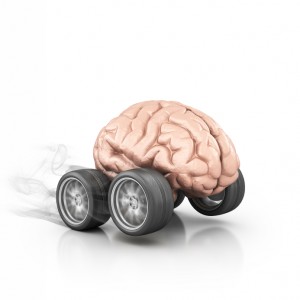Somatopsychic Chewing Gum

No flu here!
Psychosomatic illness is one that is “caused or aggravated by a mental factor such as internal conflict or stress”. We know that the brain can create disturbances in the body. But what about the other way round? Can we have somatopsychic illnesses? Or could the body produce somatopsychic wellness – not a disease but the opposite of it?
I’ve written about embodied cognition in the past (here, here, and here). Our body clearly influences the way we think. But could our body influence the way we think and our thinking, in turn, influence our body? Here are some interesting phenomena I’ve discovered recently in the literature.
Exercise and mental health – I’ve seen a spate of articles on the positive effects of physical exercise on mental health. This truly is a somatopsychic effect. Among other things, raising your heartbeat increases blood flow to your brain and that’s a very good thing. Exercise also reduces stress, elevates your mood, improves your sleep, and – maybe, just maybe – improves your sex life.
Chewing gum and annoying songs – ever get an annoying song in your head that just won’t go away? For me, it’s the theme from Gilligan’s Island. New research suggests that chewing gum could alleviate – though not completely eliminate – the song. One researcher noted that, “producing movements of the mouth and jaw [can] affect memory and the ability to imagine music.” Why jaw movements would affect memory is anyone’s guess.
Hugs and colds – could hugging other people help you reduce your chances of catching a cold? You might think that hugging other people – especially random strangers – would increase your exposure to cold germs and, therefore, to colds. But it seems that the opposite is, in fact, the case. The more you hug, the less likely you are to get a cold. Hugging is a good proxy for your social support network. People with strong social support are less likely to get sick (or to die, for that matter). Even if you don’t have strong social support, however, increasing your daily quota of hugs seems to have a similar effect.
Sitting or standing? – do you think better when you’re sitting down or standing up? At least for young children – ages seven to 10 – standing up seems to produce much better results. Side benefit: standing at a desk can burn 15% to 25% more calories than sitting. Maybe this is why it’s a good thing to be called a stand-up guy.
Clean desk or messy desk (and here) – it depends on what behavior you’re looking for. People with clean desks are more likely “to do what’s expected of them.” They tend to conform to rules more closely and behave in more altruistic ways. People at messy desks, on the other hand, were more creative. The researchers conclude: “Orderly environments promote convention and healthy choices, which could improve life by helping people follow social norms and boosting well-being. Disorderly environments stimulated creativity, which has widespread importance for culture, business, and the arts.”
So, what does it all mean? As we’ve learned before, the body and the brain are one system. What one does affects the other. Behavior and thinking are inextricably intertwined. When your brain wanders, don’t let your feet loaf.
Improving Self-Control

Use your left hand.
Yesterday I wrote about self-esteem and self-control. In the last thirty years of the 20th century, we thought that self-esteem might be the key to success. Now we think of self-esteem as the result of success rather than the cause of it. What counts is self-control or, as some writers phrase it, the building of character.
So how do we improve self-control? The short answer is that we need to practice it just as we practice any other skill. Here are eight suggestions from the research literature.
Use your non-dominant hand more frequently – researchers asked people to use their non-dominant hand for routine activities, like drinking coffee, for two weeks. Because these tasks restrained “natural inclinations” they required constant self-control. At the end of two weeks, the participants had better self-control and also “controlled their aggression better than others” who had not participated. You may well get similar results by improving your posture or policing your language.
Think about God – Kevin Rounding and his colleagues conducted experiments in which participants completed a variety of self-control exercises. Prior to the exercises, half the group played word puzzles that contained religious or divine themes. The other half played similar word puzzles with non-religious themes. Those who were exposed to religious themes had better self-control.
Laughter – laughter apparently interrupts your thought processes in useful ways. Rather than focusing on self-regulation, you can gain a brief reprieve. You let your “willpower muscle” relax and replenish.
Don’t use social media – consumer researchers, Keith Wilcox and Andrew Stephen, studied the effects of browsing social media on post-browsing behavior. They found that browsing social media increases self-esteem, which has negative behavioral effects. “This momentary increase in self-esteem reduces self-control, leading those [who browse] to display less self-control after browsing a social network compared to not browsing a social network.”
Focus on long-term goals – researchers Nidhi Agrawal and Echo Wen Wan found that health-related communications have more impact on ego-depleted people when the message focuses on long-term goals. “[W]hen [the participants] looked to the future and linked the health task to important long-term goals, they exerted self- control and were not affected by being tired or depleted. “
Clench your muscles – perhaps your physical muscles and your willpower muscles are related. Consumer researchers Iris Hung and Laparna Labroo found that embodied cognition plays a role in self-control. Participants who clenched a muscle – a fist, the calves, whatever – showed better self-control than those who didn’t.
Don’t banish the treat – researchers at Catholic University in Leuven, Belgium found that the presence of an actual treat – like M&Ms – improved participants’ self-control. The treats are actionable – you can grab a handful and eat them or decide not to. Deciding not to is an action that improves self-control in ways that avoidance doesn’t. Actionability proved to be a “pivotal variable” in self-control strategies.
Say “I don’t” rather than “I can’t” – perhaps the importance of actionability comes from emphasis on choice. A study by Vanessa Patrick, a marketing professor at the University of Houston, examined the wording of self-talk on self-control. “When participants framed a refusal as ‘I don’t’ (for instance, ‘I don’t eat sugar’) instead of ‘I can’t,’ they were more successful at resisting the desire to eat unhealthy foods or skip the gym.” Patrick comments, ““Saying ‘I can’t’ connotes deprivation, while saying ‘I don’t’ makes us feel empowered and better able to resist temptation.”
There’s plenty more research on self-control that I expect to write about in the near future. Interestingly, some of the best articles come from consumer researchers and marketers. They apparently want to understand how our self-control works so they can manipulate it. Stay tuned.
Aristotle, Cyberpunk, and Extended Minds

How far does it go?
Aristotle argued against teaching people to read. If we can store our memories externally, he argued, we won’t need to store them internally, and that would be a tragic loss. We’ll stop training our brains. We’ll forget how to remember.
Aristotle was right, of course. Except for a few “memory athletes”, we no longer train our brains to remember. And our plastic brains may well have changed because of it. The brain of a Greek orator, trained in advanced memory techniques, was probably structurally different from our modern brains. What we learn (or don’t learn) shapes our physical brains.
Becoming literate was one step in a long journey to externalize our minds. Today, we call it the “extended mind” based on a 1998 paper by the philosophers Andy Clark and David Chalmers. Clark and Chalmers ask the simple question: “Where does our mind stop and the rest of the world begin?” The answer, they suggest, is “… active externalism, based on the active role of the environment in driving cognitive processes.”
If our minds extend beyond our skulls, where do they stop? I see at least three answers.
First, the mind extends throughout the rest of the body. As we’ve seen with embodied cognition, we think with our bodies as much as our brains. The physical brain is within our skulls but the mind seems to encompass our entire body.
Second, our minds extend to other people. We know that the people around us affect our behavior. (My mother warned me against running with a fast crowd). It turns out that other people affect our thoughts as well, in direct and physical ways.
The physical mechanism for “thought transfer” is the mirror neuron – “…a neuron that fires both when an animal acts and when the animal observes the same action performed by another.” When we see another person do something, our mirror neurons imitate the same behavior. Other people’s actions and moods affect our thoughts. We can – and do –read minds.
The impact of our mirror neurons varies from person to person. The radio show Invisibilia recently profiled a woman who could barely leave her own home so affected was she by other people’s thoughts. (You can find the podcast, called Entanglement, here). The woman was so entangled with others that it’s nearly impossible to draw a line between one mind and another. Perhaps we’re all entangled – each brain is like a synapse in a much larger brain.
Third, we can extend our minds through our external devices. We now have many ways to externalize our memories and, perhaps, even our entire personas. In Neuromancer, the novel that launched the cyberpunk wave, people save their entire personalities and memories on cassette tapes. (How quaint). They extend their minds not only spatially but also into the future.
Neuromancer is about the future, of course. What about today’s devices … and, especially, the world’s most popular device, the smartphone? As we extend our minds through smartphones, do we reduce the “amount of mind” that remains within us? Do smartphones make us dumb? Or, conversely, do they increase the total intelligence availability to humanity – some of it in our brains and bodies and some of it in our external devices?
Good questions. Let’s talk about them tomorrow.
Happiness and High Dudgeon

I’m always happy!
Some years ago, I discovered that I could improve my mood (and maybe my performance) simply by forcing myself to smile. I knew that being happy made me smile. I wondered if smiling could make me happy. Happily, it could.
As we’ve discussed before (here and here), the body and the brain are one system. The brain affects the body and the body returns the favor. Your posture affects your thoughts and your mood. According to Amy Cuddy, it can even help you get a job.
In fact, you don’t even have to smile. Just hold a pencil in your mouth sideways. Your smile muscles will flex and your mood will lift. Even though you know you’re tricking yourself, it actually works. Indeed, it’s foolproof.
When I discovered all this, I thought, “Great. I can always be happy. I’ll never be cranky or curmudgeonly again. I’ll always be in a good mood.”
But something funny happened on the way to happiness nirvana. I discovered that, on many occasions, I simply didn’t want to smile. I found that I actually enjoyed being cranky, snarky, and even a tad self-righteous.
This was a revelation. I’m a reasonably positive person and I always assumed that – if I had the choice – I would opt for happiness rather than its opposite. But I do have a choice and I find that I don’t always exercise it.
The dilemma seems to be the difference between being right and being happy. When I know I’m right – and somebody else is wrong – I can work myself into high dudgeon (as my mother called it). It’s a sense of self-righteous anger. I know I’m right and I want to prove the other side wrong. I’m indignant. I want to expose them for what they are – craven fools. My self-righteousness fuels the fire. I have no time to be happy. I’m on a mission.
I also enjoy winning, whether it’s an argument or a race or a poker hand. In a roundabout way, then, high dudgeon can lead to happiness. My indignation provides the energy and determination that can power me to victory. And victory makes me happy.
Getting angry to get happy, however, is a very odd dynamic. You’re going the wrong way. And winning one victory can simply lead to another battle. If there’s a victor, there’s also a vanquished. And he wants to get even.
I promised to write about happiness. First, I want to explore this conundrum of happiness and high dudgeon. Think about it. Do you actually want to be happy? Or, put another way, if you had to choose, would you rather be happy or right?
Mind and Body

Happy Girl
How much does your body affect your brain? A lot more than we might have guessed even just a few years ago. The general concept — known as embodied cognition – holds that the body and the brain are one system, not two. (Sorry, Descartes). What the body is doing affects what the brain is thinking.
I’ve written about embodied cognition before (here and here). Recently, I’ve seen a spate of new stories that extend our understanding. Here’s a summary:
The power pose – want to perform better in an upcoming job interview? Just before the interview, strike a power pose for two minutes. Your testosterone will go up and your cortisol will go down. You’ll be more confident and assertive and knock ’em dead in the interview. Amy Cuddy explains it all in the second most-watched TED video ever.
Willpower, dissension, and glucose – If you run ten miles, you’ll deplete your energy reserves. You may need to relax and refuel before taking up a new physical challenge. Does the same thing happen with willpower? Apparently so. If you resist the temptation to smoke a cigarette, you’ll have less willpower left to resist eating a donut. You can use up willpower just like you use up physical power. Perhaps that’s why you’re more likely to argue with your spouse when your glucose levels are low. If you sip a glass of lemonade, you might just avoid the argument altogether.
Musicians have better memories – experiments at the University of Texas suggest that professional musicians have better short- and long-term memories than the rest of us. For short-term memory (working memory), the musicians are better at both verbal and pictorial recall. For long-term memory, they’re better at pictorial recall. Maybe we should invest more in musical education.
How you walk affects your mood – as the Scientific American points out, “A good mood may put a spring in your step. But the opposite can work too: purposefully putting a spring in your step can improve your mood.” As Science Daily points out, the opposite is also true. If you walk with slumped shoulders and head down, you’ll eventually get grumpy. Your Mom was right: standing up straight actually does affect your mood and performance.
Intuition may just be your body talking to you – when you get nervous, your palms may start to sweat. Your mood is affecting your body, right? Well, maybe it’s the other way round. Your intuition (also known as System 1) senses that something is amiss. It needs to get your (System 2) attention somehow. What’s the best way? How about sweaty palms and a racing heartbeat? They’re simple, effective signaling techniques that are hard to ignore.
The power of a pencil – want to get happy? Hold a pencil in your mouth like the woman in the picture. Your facial muscles act as if they’re smiling. You may consciously realize that you’re not smiling but it doesn’t really matter – your body is doing the thinking for you.